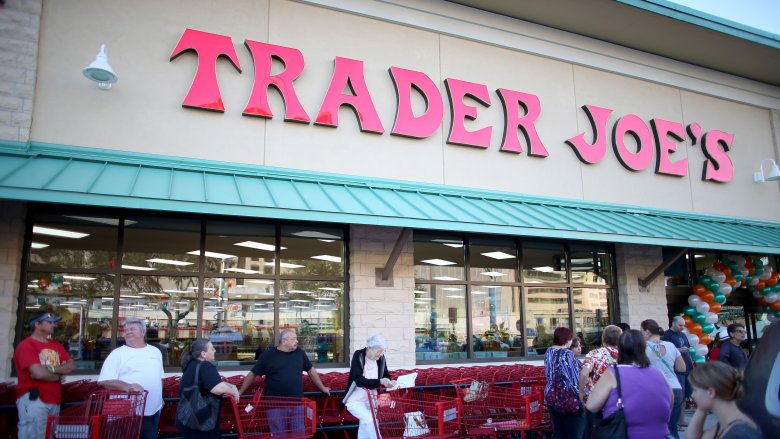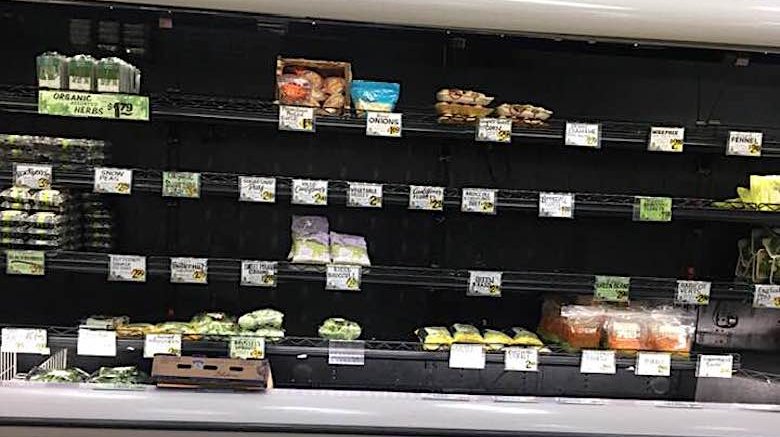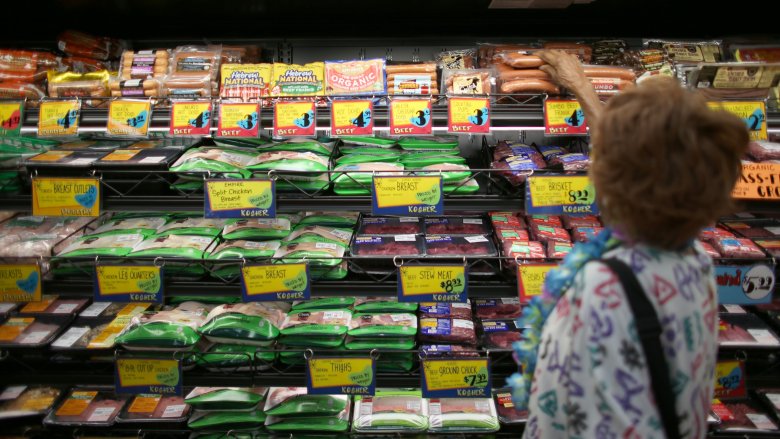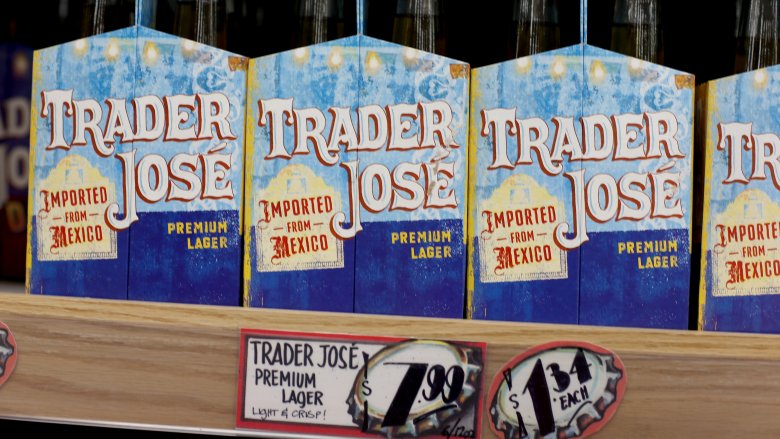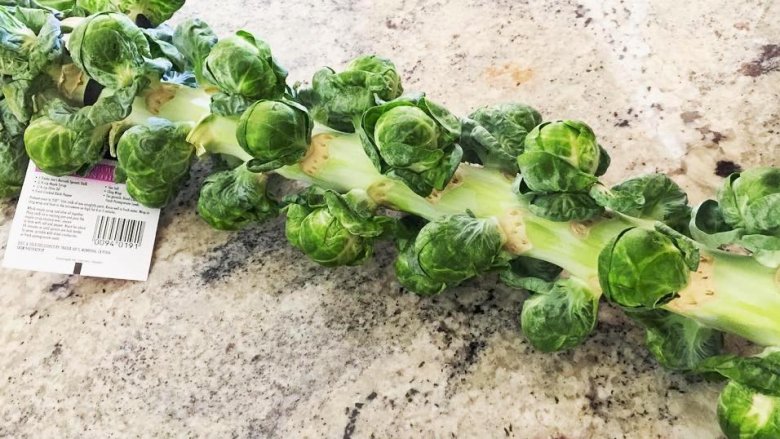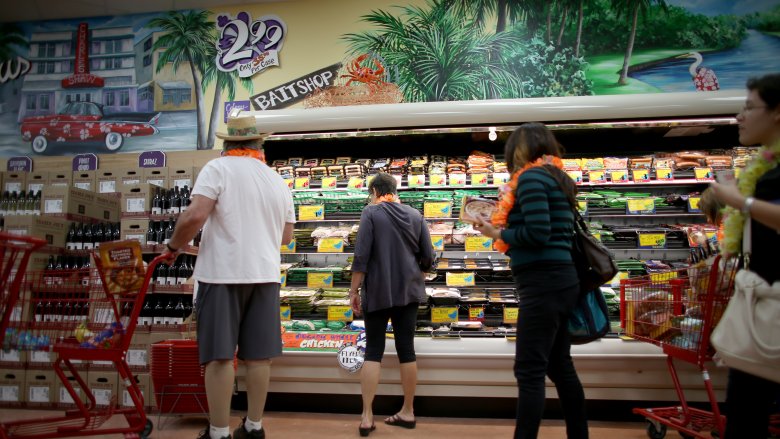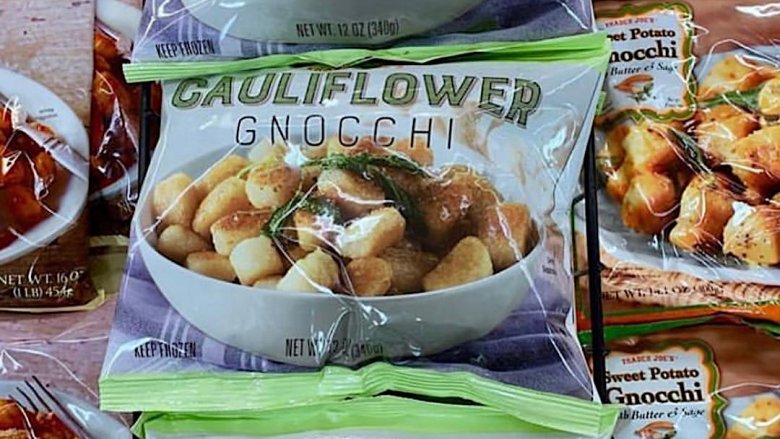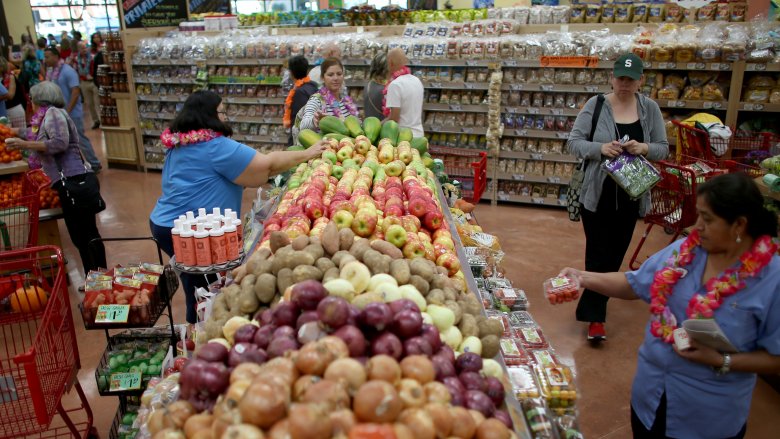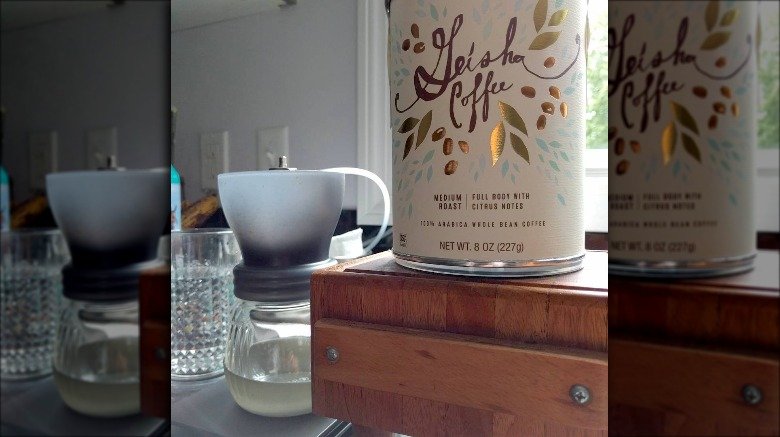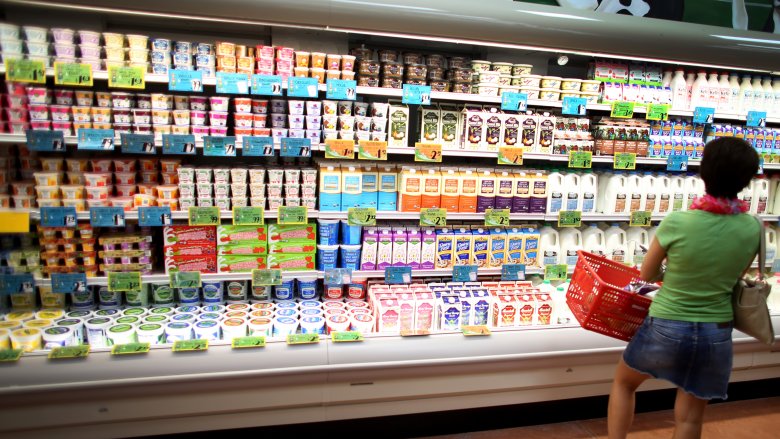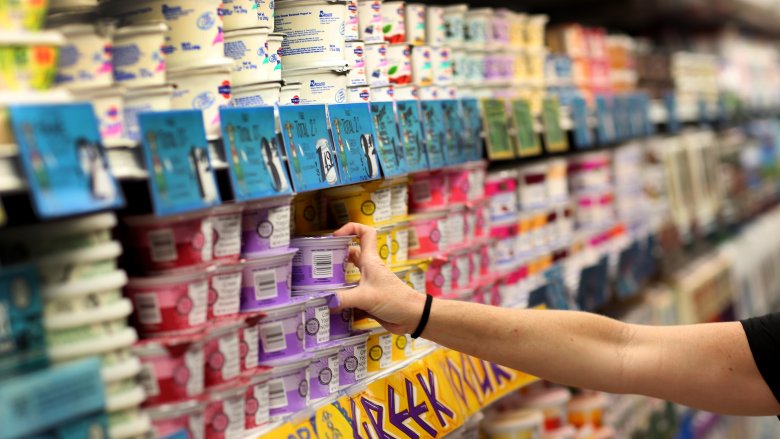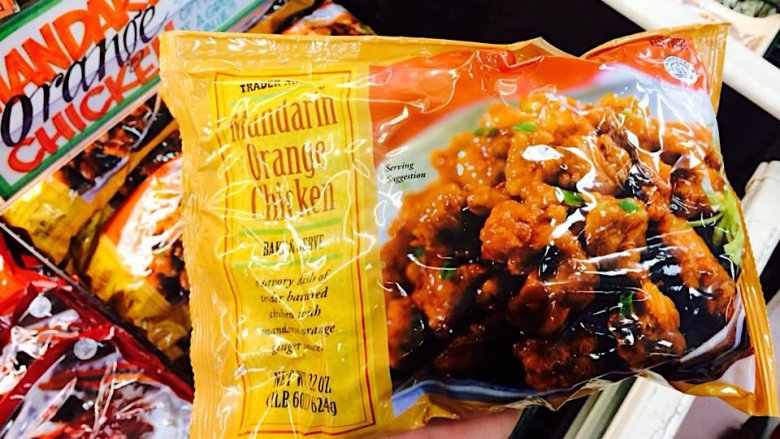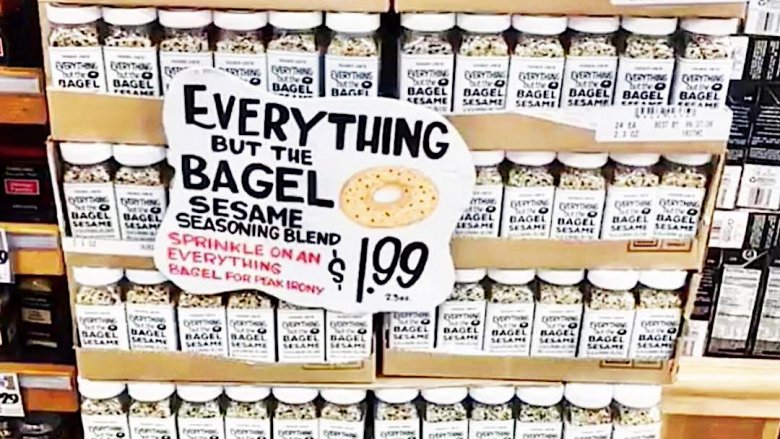The Real Reason Trader Joe's Is Always Out Of Products
It's hard to come up with many reasons not to adore Trader Joe's, what with its charming-if-inexplicable nautical theme and perpetually happy crew in Hawaiian shirts. After all, they've got a return policy that rivals Costco's, they're home to the famous Two Buck Chuck, and their products are not only ridiculously delicious but notoriously inexpensive.
But those products, cheap as they may be, have a reputation for disappearing just when you fall in love. Maybe they'll come back, maybe they won't — it can feel like a cruel game of chance. One day, you're wandering the aisles, pining for that to-die-for cookie butter cheesecake you thought was gone forever, and bam, there it is, staring back at you. You feel like you hit the lottery, but you don't get cocky — no, you've been here too many times.
It's one of the only downsides to shopping at Trader Joe's, but like it or not, the case of the vanishing product is actually part of what makes the store so great. Because, as it turns out, there is some method to this madness. Here's the real reason Trader Joe's is always out of products.
The truck to shelf system
In March 2019, a Redditor claiming to work for the largest Trader Joe's in America had readers riveted with their inside knowledge of why it can seem like stores are always out of products. One of the biggest reasons, they explained, is because the company practices a "truck to shelf" system. "If you're asking why we run out sometimes, that has to do with ordering and warehouse. In order to prevent food waste, we order in a system called 'truck to shelf,' which is what it sounds like. We don't want to order too much. Sometimes we end up with too little. But for us, that's better, because it's less waste. It helps keep prices down."
A Trader Joe's manager who spoke to Domino confirmed the truck to shelf system, and explained that since there's no huge stockroom, what you see on the floor is what you get. While it might be limiting, it means products, particularly produce, is fresh. "You know that bag of spinach hasn't been sitting in a box in the back for five days."
As frustrating as it can be from a consumer's standpoint, we can all get behind a company that's committed to less waste, right?
The gangway factor
In keeping with its sea-faring theme, Trader Joe's applies the "gangway factor" to its products. Say what? Gangway, with its nautical stylings and which can also be defined as an interjection meaning "out of the way!" actually makes perfect sense here...
See, Trader Joe's stores are typically the opposite of ginormous, and that means that they can't just keep adding new products on top of old products, particularly if a product isn't doing well. Which brings us to the gangway factor — according to the company's FAQs, it's the reason a product might be discontinued. "Because we introduce new products every week, we have to eliminate items that aren't selling strongly enough to earn their spot on the shelf. It's a matter of space. And it keeps things interesting," they explain. In other words, those duds simply have no choice but to "gangway!" Yes, it's a bummer when one of your favorites doesn't make the cut, but think of all the tasty new products that may have landed in their place.
The price went up
If there's one thing you can count on at Trader Joe's, it's a good value for a good product. According to the company, "Our mission is to bring you the best quality products at the best prices." Unfortunately, that means that if the price of a product goes up, and the increase is outside of their control, they might axe it rather than pass that price hike onto customers.
Trader Joe's explains in their FAQs that this is one of the factors that determines the fate of a product: "The cost of producing the item may increase (change in commodity prices, new manufacturing requirements, etc.), and in turn, the price. If it no longer makes sense as a value, then we may choose to discontinue it."
It's hard to be mad at a company that is so adamant about keeping prices low — it's actually kind of refreshing. Keep that in mind next time you're cursing them for discontinuing your favorite fruit leather.
It could be seasonal
There are certain products at Trader Joe's that we know won't last forever — Candy Cane Joe Joe's and pumpkin-flavored anything comes to mind. They're seasonal, of course, and if there isn't even room on the shelves for regular product, you can't expect stores to keep Christmas-flavored foods into the summer. But it isn't just the holiday-centric items that are seasonal. It's fresh produce, too. Makes sense when you think about it, right? Certain fruits and veggies just aren't available year-round at bargain prices, and like it or not, it's one reason that a product is "discontinued," if even for a short time. The company explains why a product might disappear, saying, "It may be a seasonal product — for example, Brussels Sprouts Stalks, which are only available specific times of the year."
The in-the-know Redditor breaking down all the Trader Joe's product rules said it this way: "...if you're asking about seasonal items and discontinuation, that has a lot to do with driving sales and trying to keep things fresh. We don't do sales (we can't, our prices are already too low) and we don't advertise. So seasonal and special items keep people coming back." And it's true, isn't it? If you know that each summer TJ's is going to release that absolutely perfect Carolina Gold BBQ Sauce, won't you keep coming back when the weather warms up? Of course you will.
Other stores might be bogarting it
If you happen to be lucky enough to live within driving distance of multiple Trader Joe's locations, the next time your nearest store is out of Bamba Peanut Snacks (which 100 percent must include crack as an ingredient, because otherwise why are they so dang good?), it might just be a matter of driving to the next closest location to get your hands on the good stuff.
That's because, according to our wise Redditor friend, a lack of product in one store might be the result of another nearby store bogarting more than their fair share — and that's just one of the warehouse issues that might arise. "... could be that they sent us the wrong thing, or too little, or that they're out too. The warehouses usually supply anywhere from 5 to 10 stores in the region. If one store orders too much, that could leave another store with too little," the alleged Trader Joe's employee explained.
If you don't live close enough to the next store, you'll just have to cross your fingers that the next day's delivery rights today's wrong.
You can blame it on social media
Social media can do a lot of good in this world — it can spread important news faster than ever before, it can crowdfund better than any other method, and it can lead to connections and community that wouldn't otherwise be possible. But it can also make a Trader Joe's product so ridiculously popular that you have trouble laying eyes on it for the better part of a year.
We present to you the Trader Joe's Cauliflower Gnocchi. Cooking Light reported on this viral food trend in April 2018, and thanks to the power of social media, this unlikely Instagram hero is still nearly impossible to find a year later. One Munchies writer, in March 2019, confessed to frequenting multiple stores and timing it just right in order to stock up on the cauliflower gnocchi, saying that while all the other frozen cauliflower products were present and accounted for, this cult favorite always seems to be out. Still.
Moral of the story? Don't fall in love with social media's next Trader Joe's darling, unless you're in the mood for daily heartbreak.
It might be unavailable, plain and simple
This might come as a surprise, but there's not actually some unicorn-powered product-making machine sitting in the back of each store, cranking out perfect replacements of products when stock runs low. No, Trader Joe's gets its products from real-life suppliers who sometimes have real-life production issues, or — brace yourselves for this one — from real-life suppliers who can't simply wave a magic wand and make fruits and veggies grow on demand.
That's according to the all-knowing Trader Joe's employee on Reddit, who explained another reason why stores might be out of a certain product at any given time: "There's also the problems of QA — quality assurance — and production delay. If something is QA'd it's because there's an issue with the product, like an allergen contamination. If our producers or growers can't grow enough... that could leave us with a shortage..." They later elaborated, saying, "Last year we had a few months when we kept running out of lemons because our growers couldn't grow enough. It was too cold in the south, and too warm in the north."
At the end of the day, wouldn't you rather know you're buying quality products (that aren't contaminated with a deadly allergen), even if it means you have to wait a week?
It might just be REALLY limited
Okay, real talk: Sometimes it seems like Trader Joe's just likes to mess with us when it comes to product availability. Take, for instance, the product that had everyone scrambling for a taste in 2017: the extremely limited edition Geisha Coffee.
How limited, you ask? Only 48 cans of the pricey coffee ($20 for 8 ounces) were available per store. Not per store, per day. Per store. Period. According to the packaging, "Geisha trees grow quite tall with elongated leaves, but the plants actually produce a smaller crop than most coffee plants. This, combined with elevation restrictions, makes Geisha coffee difficult to cultivate and in short supply."
So, let's call a spade a spade here... Trader Joe's knew exactly what they were doing by offering up this practically once-in-a-lifetime product that only a handful of customers could actually purchase. They were creating buzz, which likely got more customers in the door, and when they couldn't find the Geisha coffee, probably filled their carts with $100 worth of other available product. It's genius, really.
And a bunch of other reasons, too
By now we know that there are many reasons why Trader Joe's might be out of a particular product. At this point, it seems like chances are better that something will be out of stock or discontinued rather than sitting on the shelf, ready to be purchased. Unfortunately, we've got a few more reasons your favorite item might be out of stock, courtesy of our resident Trader Joe's insider on Reddit.
In no particular order, here's why your next shopping trip might end in disappointment:
- "... we have something known as an order cap. That means we can only order a certain number of cases of a certain item a day. That could happen for a number of reasons: production delay, grower issues, etc."
- "... other times, we discontinue an item temporarily in order to rework the recipe or packaging."
- "Sometimes with the small lot, it's an opportunity buy, meaning we only bring it in if it's cheap."
But hey, it's all part of that Trader Joe's experience, and we keep going back for more, so it must not be too bad.
You can easily find out the status of a product
Though it seems like products just disappear willy-nilly off the shelves at Trader Joes, it turns out there's actually a system in place that can tell you the status of your latest favorite — all you have to do is ask a crew member.
One Redditor who claims to work for Trader Joe's says that the most common question they receive both on Reddit and in store is, "Does anyone know if XYZ product is gone?" It turns out it's easy to get an answer. "Any crew member at any store can look up the status of any product, we are able to see if there is a temporary stocking issue at the warehouse, if it is seasonal, and some times there is even an estimated date of return," the employee explained.
Another Redditor chimed in to explain that "discontinued" doesn't always mean what you think it means, however, saying, "...the term 'to be discontinued' is used really loosely in the crew database. For example, the cold brew bags were new this summer and sold well. There's a very probable chance that the 'discontinued' means it'll be returning next summer. Same with the limited edition soaps." That's great news, but when discontinued really does mean discontinued, you'll wish you'd stocked up.
You can effect change
Think there's nothing you can do about a product that disappeared or that your store doesn't carry? It turns out you do have a powerful weapon at your disposal: your voice.
According to an alleged Trader Joe's employee on Reddit, if you make enough noise, you might just get that product to come back. "If you ask enough, talk to other local customers, and email corporate, the more likely we are to bring products in. We're all about supply and demand here," they said. Another TJ's Redditor echoed the advice, saying, "As I tell every customer whom I've had to break the terrible news to, the Trader Joe's website is the absolute best place to let us know you miss a particular product or wish we'd carry a particular type of product. There are actual Trader Joe's employees on the receiving end of those messages paying close attention to our customers' requests and wishes!"
The company also encourages customers to let them know if a product isn't up to snuff so that they can try to fix the problem rather than just discontinue it due to poor sales. Domino spoke with a Trader Joe's manager who explained that customer feedback is important when it comes to the fate of a product. For instance, because they received so much feedback on their dish soap having a lack of suds, they were able to reformulate it and bring it back, instead of just canning it altogether.
One product that probably isn't going anywhere
If consumers can elevate a Trader Joe's product to the status of cult favorite, it's likely that it'll stick around. Case in point: Trader Ming's Mandarin Orange Chicken.
This ultra-convenient, utterly delicious product hit freezers in 2004 — after gaining unanimous approval from the company's tasting panel in 2002 — and it's been going strong ever since. In fact, Domino reported in 2018 that the crispy-crunchy, sweet-and-sour chicken had won the "Favorite Overall" category in Trader Joe's Customer Choice Awards for nine years running. It should come as no surprise then that the frozen favorite again took home the same title in 2019.
That one product has managed to hang on tight, even while others were dropping like flies around it. If that's not proof that voting with your dollars works, we don't know what is. The lesson here? When you find a product you love, buy, buy, buy.
If all else fails, check the black market
We're not saying this is going to happen, but have you thought about what you'd do if your beloved Everything But the Bagel Sesame Seasoning suddenly disappeared? You'd check the Trader Joe's black market, that's what you'd do.
Yes, this is really a thing that exists, though it's really more of a "gray market," since it is legal to resell a product purchased at retail. A quick Amazon search is all you need to see the bevy of Trader Joe's products you can buy at the click of a button, but don't be fooled — these are not sold by the company itself, and as they told Refinery29, "We do not authorize the reselling of our products and cannot stand behind the quality, safety or value of any Trader Joe's product sold outside of our store."
So, if you're not lucky enough to live near a Trader Joe's, or if a product you love disappears, there's probably still a way to get your hands on it. Just know that you might have to shell out $6.75 for that same container of bagel seasoning that cost you $1.99 in stores.
